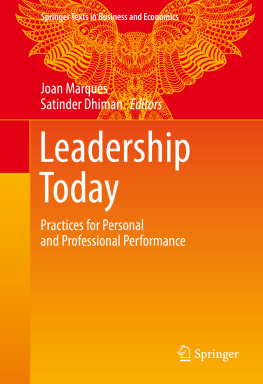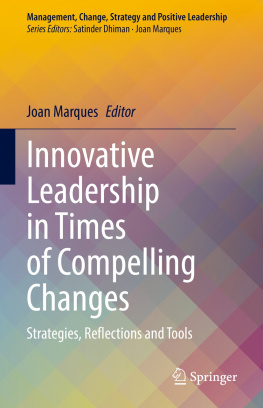Joan Marques - Leadership Today
Here you can read online Joan Marques - Leadership Today full text of the book (entire story) in english for free. Download pdf and epub, get meaning, cover and reviews about this ebook. City: Cham, year: 2017, publisher: Springer International Publishing, genre: Business. Description of the work, (preface) as well as reviews are available. Best literature library LitArk.com created for fans of good reading and offers a wide selection of genres:
Romance novel
Science fiction
Adventure
Detective
Science
History
Home and family
Prose
Art
Politics
Computer
Non-fiction
Religion
Business
Children
Humor
Choose a favorite category and find really read worthwhile books. Enjoy immersion in the world of imagination, feel the emotions of the characters or learn something new for yourself, make an fascinating discovery.
- Book:Leadership Today
- Author:
- Publisher:Springer International Publishing
- Genre:
- Year:2017
- City:Cham
- Rating:4 / 5
- Favourites:Add to favourites
- Your mark:
- 80
- 1
- 2
- 3
- 4
- 5
Leadership Today: summary, description and annotation
We offer to read an annotation, description, summary or preface (depends on what the author of the book "Leadership Today" wrote himself). If you haven't found the necessary information about the book — write in the comments, we will try to find it.
Joan Marques: author's other books
Who wrote Leadership Today? Find out the surname, the name of the author of the book and a list of all author's works by series.
Leadership Today — read online for free the complete book (whole text) full work
Below is the text of the book, divided by pages. System saving the place of the last page read, allows you to conveniently read the book "Leadership Today" online for free, without having to search again every time where you left off. Put a bookmark, and you can go to the page where you finished reading at any time.
Font size:
Interval:
Bookmark:
Soft Skills
- There is no leadership without a sense of purpose. Whether a self-leader or a leader of self and others, the practitioner needs to have a sense of purpose in order to take on a leadership role that will enable actions.
- Trust will be presented as a critical skill in establishing and maintaining strong relationships with internal and external stakeholders. The chapter will emphasize the dire consequences of a lack of trust, and the effects this has on all parties involved.
- A brief overview of the most common moral theories will be captured in this chapter, with inclusion of their strengths and weaknesses. The most important take-away, however, will be a quick moral test, which can be applied in all challenging circumstances.
- Discussing the need to evaluate ones values, in order to safeguard them, and ensure that they are not merely adopted mindlessly, but are truly in line with ones real beliefs. This chapter will also discuss the difference in values among cultures and the need to understand and work with these differences.
- Explains the importance of keeping an eye on the future and provides some important tools regarding the nourishment of a visionary approach. Encourages the reader to make conscious choices in surrounding himself or herself with individuals who can contribute to renewed visions on a regular basis.
- Underscores the importance of being honest and truthful to the self and others. Explains the complexity and unfulfilling nature of merely saying what one thinks others want to hear, and thereby becoming entangled in political webs and loss of values.
- Emotional intelligence will be defined in light of ones ability to monitor ones own and other peoples emotions. The various models of EQ will be reviewed, and some practical guidelines will be provided in processing emotional information and using it to navigate the social environment.
- This chapter underscores the importance of spirituality in the workplace and its role in leading organizations. It focuses specifically on contributing to readers awareness about the vital difference between religion and spirituality. The chapter builds on the premise that fundamental problems facing our organizations and the society today can only be solved at the level of human spirit. The chapter further postulates that the real spirituality is not indifference to the world but love and compassion born out of identifying oneself with all beings.
- This chapter explores the inherent interconnectedness of sustainability and spirituality, and the role of leadership in honoring and maintaining this interconnectedness. It postulates that unless peoples moral and spiritual qualities are nurtured and developed, the best of sustainability efforts will not work. The chapter contends that true ecological sustainability, in contrast to the cosmetic variety we see around us, depends upon our deeper understanding of fundamental spiritual values such as interconnectedness and oneness, nonviolence and compassion, contribution and selfless service.
- This chapter will underscore the tendency of many people to regress in a sleepwalking mode, in which they mindlessly make decisions and go through motions, without considering long-term consequences, or even whether these decisions are in line with their values. Mindfulness will be approached from a Buddhist foundation, yet presented with careful consideration of a broad audience. Hence, the presented approach will adhere more to a psychological stance than a philosophical or religious one.
- Empathy is one of the critical leadership qualities that is hard to digest, especially in business and science-based circles. Many people consider empathy the gateway to weakness and being taken advantage of. This chapter will discuss empathy as a major strength rather than a weakness.
- This chapter will explain the difference between intrinsic and extrinsic motivation and provide examples of each. From a leadership stance, the importance of capitalizing on intrinsic motivators will be accentuated, while extrinsic motivators will also be reviewed as important foundational factors.
Font size:
Interval:
Bookmark:
Similar books «Leadership Today»
Look at similar books to Leadership Today. We have selected literature similar in name and meaning in the hope of providing readers with more options to find new, interesting, not yet read works.
Discussion, reviews of the book Leadership Today and just readers' own opinions. Leave your comments, write what you think about the work, its meaning or the main characters. Specify what exactly you liked and what you didn't like, and why you think so.










